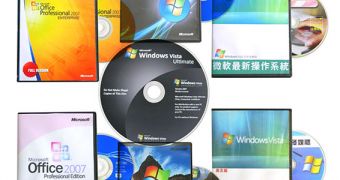Microsoft has warned consumers to exercise caution and be wary of what it referred to as "high-end" pirated products. According to the Redmond company, end users and small businesses are the most likely to fall victim to counterfeiters dealing with high-quality bootlegged software. Illustrative examples of high-end piracy are three retail outlets in Sim Lim Square, Singapore, which were raided by local authorities. Microsoft revealed that at the end of an investigation spanning over 11 years, the counterfeiters were arrested.
"Our primary concern is for consumers and small businesses who may have inadvertently purchased counterfeit products", revealed Jonathan Selvasegaram, Corporate Attorney for Intellectual Property, Microsoft South East Asia. "The serial numbers appearing on the COA that are used for software activation may be hacked keys or stolen from Volume Licensing customers. Customers of these counterfeits may be able to install the software today, but when Microsoft discovers the hacked keys or the abuse of the volume license keys, these keys will be "deactivated" and machines installed with the software will receive a notification that they are using counterfeit software."
Those arrested in the raids in Sim Lim Square risk to spend a maximum of five years behind bars and pay up to S$100,000 (Singapore dollars) in financial penalties. Microsoft revealed that the shops were not dealing only with pirated software, but also with Certificates of Authenticity. The Redmond company informed that along counterfeit copies of Windows XP Professional, Office Professional 2003, Windows Server 2000 and Windows Vista, valued at S$65,000, the authorities also confiscated COAs.
"High-end software counterfeiting is a disturbing development which affects consumers and our IT partners directly. Microsoft is committed to protecting honest partners and customers from unfair competition by dishonest traders selling or distributing counterfeit software and components", Selvasegaram added. "Not only are consumers duped into paying for counterfeit software, they are also not enjoying the full benefits of genuine software and unwittingly exposing their computer to bugs, viruses, damaged data and security threats."

 14 DAY TRIAL //
14 DAY TRIAL //